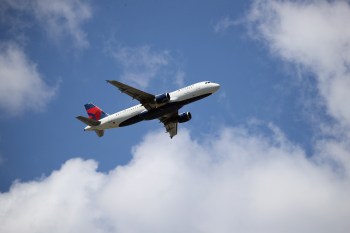The failed terrorist attack on a Christmas Day Northwest Airlines flight has prompted the TSA to roll out yet another set of security measures. Because a Nigerian man who was on a terrorism watch list almost blew up a plane with explosives sewn into his underwear, you won’t be able move, let alone read your Kindle, the last hour of flights into the US.
The TSA posted a general description of the new security measures, but airlines must have gotten more specific memos. From MSNBC:
Virgin Atlantic Airlines is telling travelers heading to the U.S. that there will be “extra screening of passengers and hand baggage at the gate immediately before boarding.” Air Canada posted notice that, under the TSA-imposed rules, “during the final hour of flight customers must remain seated, and will not be allowed to access carry-on baggage, or have personal belongings or other items on their laps….”
In a memo sent to airlines (but not posted on the TSA Web site), airlines flying to the U.S. are instructed to turn off any in-flight entertainment systems with embedded maps or GPS programs showing the plane’s exact location. Pilots and crew members are also told not to make announcements identifying landmarks below.
No more, “Folks on the right side of the plane will have a great view of the Grand Canyon.” Coupled with the arbitrary rules about liquids and personal grooming devices, does this sound like a cohesive defense strategy?
The Northwest flight took off from Amsterdam’s airport, one of the world’s most secure. That airport deploys advanced technology – a full-body imaging scanner – but it wasn’t used on Umar Farouk Abdulmutallab, despite his father’s warnings to the US State Department about his son. The scanners aren’t widely used in the United States yet, mainly because of concerns about privacy and long lines (like we don’t have those already). From the Washington Post:
Privacy groups say whole-body imaging scanners conduct a “virtual strip search,” and have mounted a campaign to stop what they predict will be the abuse of electronic images of naked individuals. In a nonbinding vote in June, the House overwhelmingly approved a measure to prevent scanners from being used for primary screening…
The International Air Transport Association, a trade group of 230 airlines, is urging U.S. and European regulators to re-engineer the aviation security system, noting that the volume of data that governments collect on travelers has mushroomed.
“We’ve spent eight years looking for little scissors and toenail clippers,” said Ken Dunlap, IATA’s director of security in North America. “Perhaps the emphasis should be looking for bad people.”
The government needs to decide where it’s going to spend its money on security. Should it focus more resources on intelligence? Would that help the TSA recognize that a disturbed man on the government’s radar might be a good candidate for a thorough search?
Or should the government go all in on preventative technology and subject everyone to the same rigorous search? Right now, despite fears about profiling, searches are still targeted and clearly not in an effective way. A man on a terror watch list can walk on board with a condom bomb stuffed into his pants, but my fiance has to undergo a full-body search because she injured her foot and is limping through the airport. It makes no sense.
All the while, the reactionary rules are costing the airlines. The weekend was filled with cancellations and delays. But seeing Secretary of Homeland Security Janet Napolitano on the Today Show doesn’t exact inspire confidence that the government is close to figuring this out:
Visit msnbc.com for breaking news, world news, and news about the economy
Your thoughts?
There’s a lot happening in the world. Through it all, Marketplace is here for you.
You rely on Marketplace to break down the world’s events and tell you how it affects you in a fact-based, approachable way. We rely on your financial support to keep making that possible.
Your donation today powers the independent journalism that you rely on. For just $5/month, you can help sustain Marketplace so we can keep reporting on the things that matter to you.


















